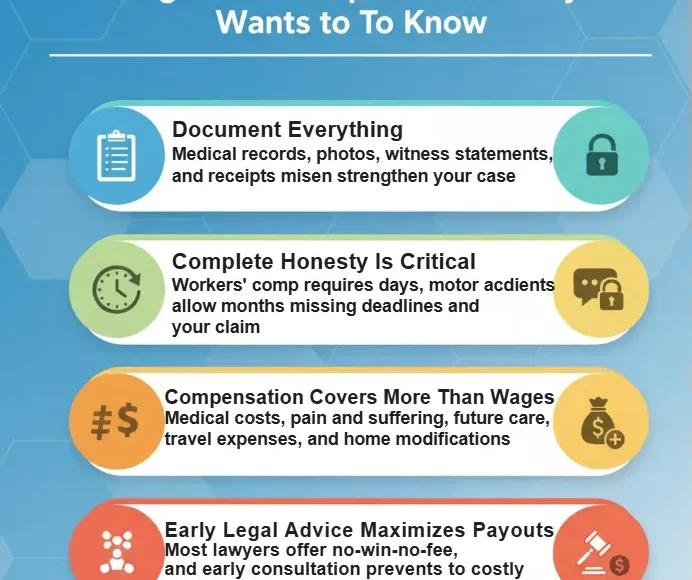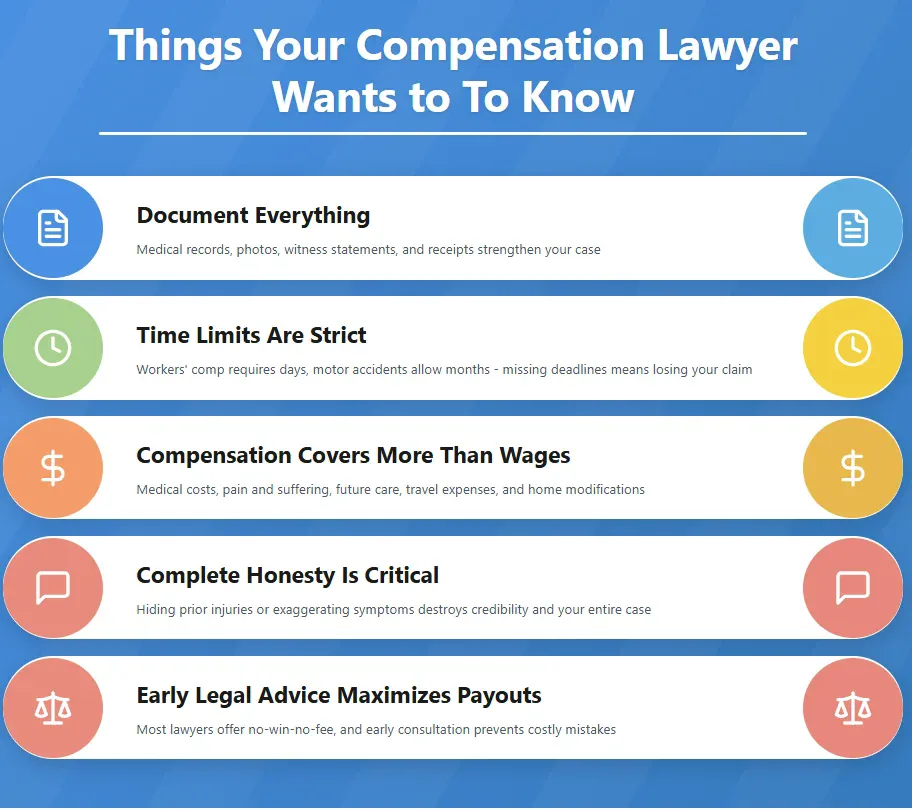Your compensation claim depends on five essentials: thorough documentation of your injury and expenses, meeting strict filing deadlines that vary by claim type, complete honesty with your lawyer about your medical history, understanding the full scope of compensation beyond just lost wages, and seeking early legal advice to maximize your payout and avoid costly errors.
When you’re preparing to file a compensation claim—whether it’s for a workplace injury, motor accident, or public liability—understanding the process can make a significant difference in your outcome. Many claimants make costly mistakes simply because they don’t know what their compensation lawyer wishes they did. Before you take action, here are five crucial insights that could strengthen your claim and help you achieve the compensation lawyer you deserve.
5 Things Your Compensation Lawyer Wants You to Know
- Evidence Is Everything: Document Every Detail
One of the first things your compensation lawyer will emphasize is the importance of strong, well-documented evidence. The success of your claim hinges on the proof you can provide. This includes:
- Medical records detailing the nature, extent, and treatment of your injury.
- Incident reports or workplace logs showing when and how the injury occurred.
- Photographs of the injury, accident site, or faulty equipment involved.
- Witness statements that corroborate your account of the event.
Every piece of documentation adds credibility and builds a compelling case. Even small details—like text messages to your supervisor about your injury or receipts for out-of-pocket expenses—can make a big impact.
- Time Limits Matter: Don’t Miss Your Window to Claim
Every compensation claim comes with strict time limits, and missing them could mean losing your right to compensation entirely. These deadlines vary depending on your location and the type of claim. For instance:
- Workers’ compensation claims typically require prompt notification to your employer—often within days.
- Motor accident claims might have a few months’ window to lodge the necessary forms.
- Public liability claims may allow longer, but waiting too long weakens the case.
A qualified compensation lawyer will guide you through these deadlines to ensure compliance. Acting quickly not only preserves your legal rights but also helps maintain the accuracy of evidence and witness recollections.
- Honesty and Transparency Build a Strong Case
Full disclosure is essential. Your lawyer needs the complete truth, even if certain details seem minor or unfavorable. Concealing prior injuries, exaggerating symptoms, or withholding information can severely damage your credibility and your entire claim.
Your lawyer’s role is to protect and advocate for you, but they can only do so effectively if they have the full picture. Be upfront about your medical history, employment status, and any previous claims. This honesty allows your legal team to prepare for potential challenges and craft a transparent, defensible argument.
- Compensation Isn’t Just About Lost Wages
Many claimants underestimate the full scope of compensation they may be entitled to. A comprehensive claim can include:
- Medical and rehabilitation expenses (both current and future)
- Lost income and superannuation contributions
- Pain and suffering or psychological distress
- Travel costs related to medical appointments
- Home modification or care expenses if the injury affects daily living
An experienced compensation lawyer will assess every aspect of your loss to ensure nothing is overlooked. The goal is not just short-term financial relief, but a settlement that reflects the true impact of your injury on your life.
- Early Legal Advice Can Maximize Your Compensation
Many people wait too long to consult a lawyer, hoping to handle things independently or avoid legal fees. However, early advice can often increase your compensation payout and reduce stress. A skilled lawyer can:
- Evaluate your eligibility and likelihood of success.
- Ensure correct filing and compliance with all procedural requirements.
- Negotiate effectively with insurers who aim to minimize payouts.
- Prevent common pitfalls that could undermine your case.
Most reputable compensation lawyers offer no-win, no-fee agreements, meaning you only pay if your claim succeeds. Seeking advice early ensures your rights are protected from the very start.
Knowledge Is Power in Every Compensation Claim
Filing a compensation claim is more than just filling out paperwork—it’s a legal process that requires precision, honesty, and strategic planning. Understanding what your lawyer wants you to know before you file can save time, reduce stress, and significantly improve your outcome. From documenting evidence to seeking prompt legal advice, these five principles form the foundation of a successful claim. By acting decisively and staying informed, you give yourself the best chance at securing the compensation you truly deserve.


